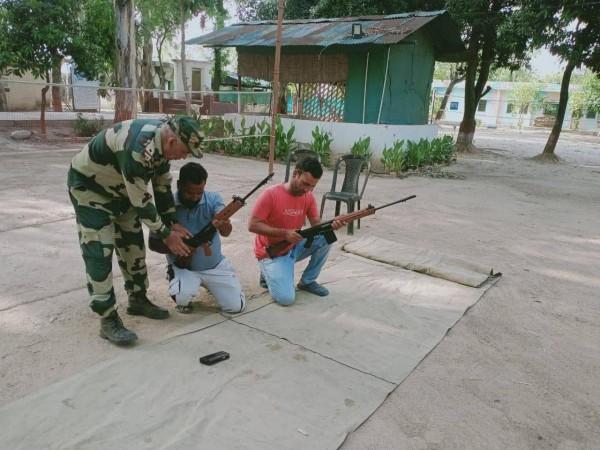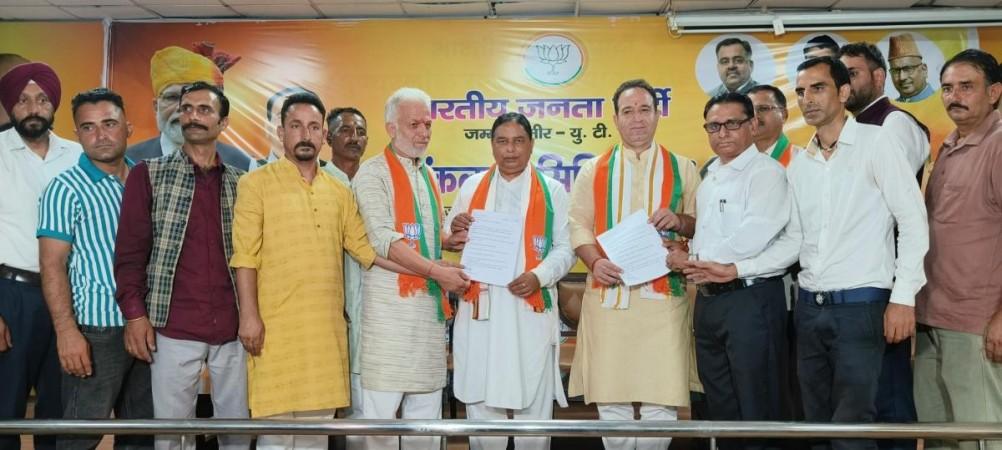
In a significant development, the BJP today held a meeting with Village Defence Groups (VDGs), aimed at acknowledging their contribution to local security and addressing their long-pending concerns.
With the Union Government already initiating the process to equip VDGs with modern weapons, today's meeting was particularly significant in light of the recent surge in terrorist activities in different parts of the Jammu region.
Following a series of encounters with terrorists in the Jammu province, the Army and the Border Security Force (BSF) have started training VDG members. While the Army is training VDGs in the hinterlands, the BSF has organized a series of training camps along the International Border in Jammu province.
Currently, a total of 100 VDG personnel are being trained at the Police Firing Range in Sunjuwan, Jammu.

The training focuses on enhancing the operational capabilities of VDG members and strengthening coordination between VDGs and security forces. Personnel are being trained in firing, basic weapon handling, tactical drills, and security protocols under the supervision of experienced Indian Army instructors. The objective is to empower local volunteers to serve as a strong support system for regular security forces in sensitive areas and respond effectively in times of emergency.
VDGs Demand Automatic Weapons, Better Benefits
During the meeting, VDG representatives submitted a detailed memorandum highlighting the critical issues faced by their personnel. They emphasized that VDGs, who play a vital role in maintaining grassroots-level security in border and remote areas, must be recognized, adequately supported, and properly equipped.
The representatives demanded that all unpaid volunteers be brought under the Union Home Ministry's 2022 policy for VDGs, which provides for honorarium and support. They strongly urged the government to provide automatic weapons to all VDGs and replace outdated weaponry with modern arms to enhance operational efficiency. They also demanded that each VDG group consist of at least 15 members.
Another major concern raised was the existing duty posting policy, which forces many VDG members to serve in distant thanas or outposts—defeating the core objective of providing security at the village level. The representatives requested that personnel be allowed to serve within their native villages, in line with the original vision of the VDGs.
Further demands included inclusion under insurance policies similar to those for police constables, coverage under the Employees' Provident Fund (EPF) scheme, and access to retirement and pension benefits. They also demanded a substantial increase in their monthly remuneration—from the current ₹4,000 to ₹12,000.
BJP: VDGs Are the First Line of Defence in Sensitive Areas
Addressing the gathering, J&K BJP President Sat Sharma hailed the VDGs as the first line of defence in sensitive regions and assured them that the party would take up their demands with the concerned authorities.

"Your service in protecting our borders and villages is invaluable. The BJP acknowledges your bravery and commitment. We are dedicated to resolving your legitimate concerns and ensuring your voices are heard at the highest levels," he said.
Leader of the Opposition in the J&K Assembly, Sunil Sharma, echoed similar sentiments, stating that VDGs are not just volunteers but frontline warriors. "It is unjust that many remain unpaid or underpaid. Their welfare is not charity—it is justice," he said, assuring the VDGs that the BJP would raise their issues at every appropriate platform.
Senior leader Rakesh Mahajan emphasized that the issues faced by the VDGs remain a top priority for the BJP, adding that the party would continue to push for policy implementation to uphold their dignity.
Basant Raj Thakur thanked the senior leadership for their attention and support. He said, "VDGs are the backbone of rural security in Jammu and surrounding regions. We are not asking for privileges—only for what we rightfully deserve as protectors of our people."
The VDG representatives expressed their gratitude for the meaningful engagement and left the meeting with renewed hope for tangible action.

What are VDGs?
Formed in the early 1990s, when terrorists started targeting members of the minority Hindu community in the remotest villages of the mountainous regions of Jammu province, the VDGs were earlier called the Village Defence Committees (VDCs).
After terrorism was contained in most of these remotest areas, the VDCs almost became inactive.
But the scheme was revived in 2022, with a renewed focus on providing financial compensation to all VDG members, whereas previously only SPOs received payment. Currently, VDG members receive a monthly honorarium ranging from ₹4,000 to ₹4,500.
There are 4,153 Village Defence Groups (VDGs) in Jammu and Kashmir, with the majority operating in the Jammu province. These groups function as part of a broader grassroots security mechanism alongside 32,355 Special Police Officers (SPOs). VDGs play an active role in civilian protection and counter-terrorism operations, operating under the supervision of district Superintendents of Police.
VDGs are trained in weapons handling, tactical drills, and security protocols, and are considered a vital line of defence in their respective areas. In addition to their security responsibilities, VDGs also assist in community-based initiatives, including support during elections at polling stations.

















